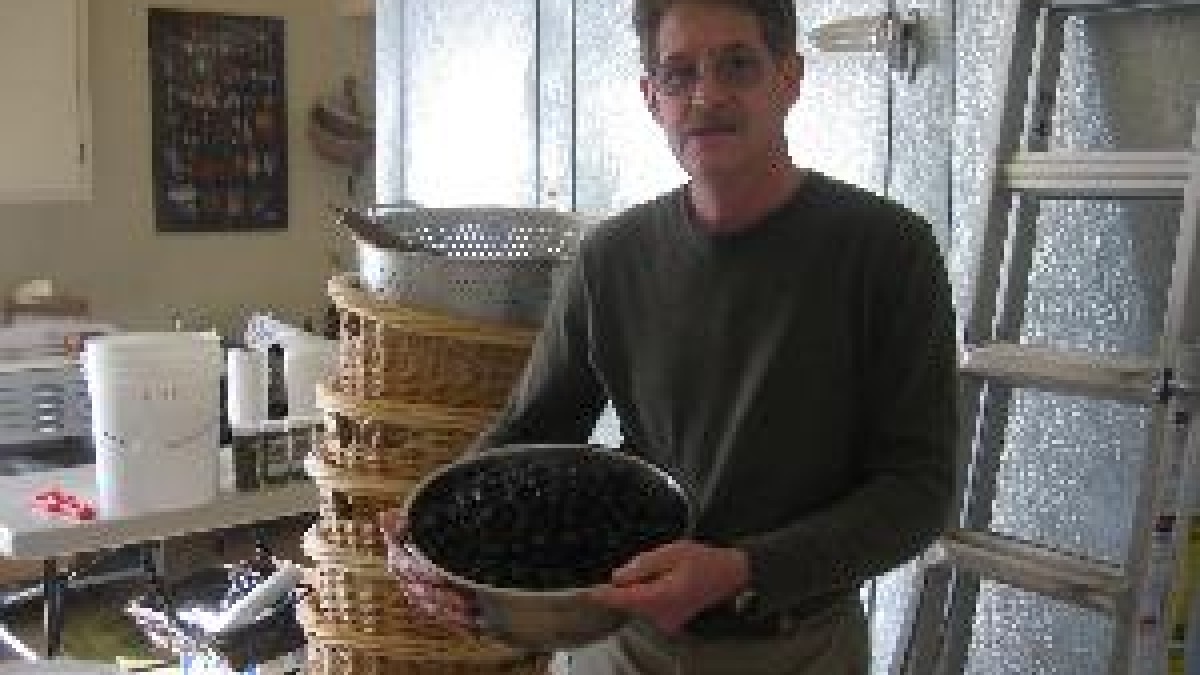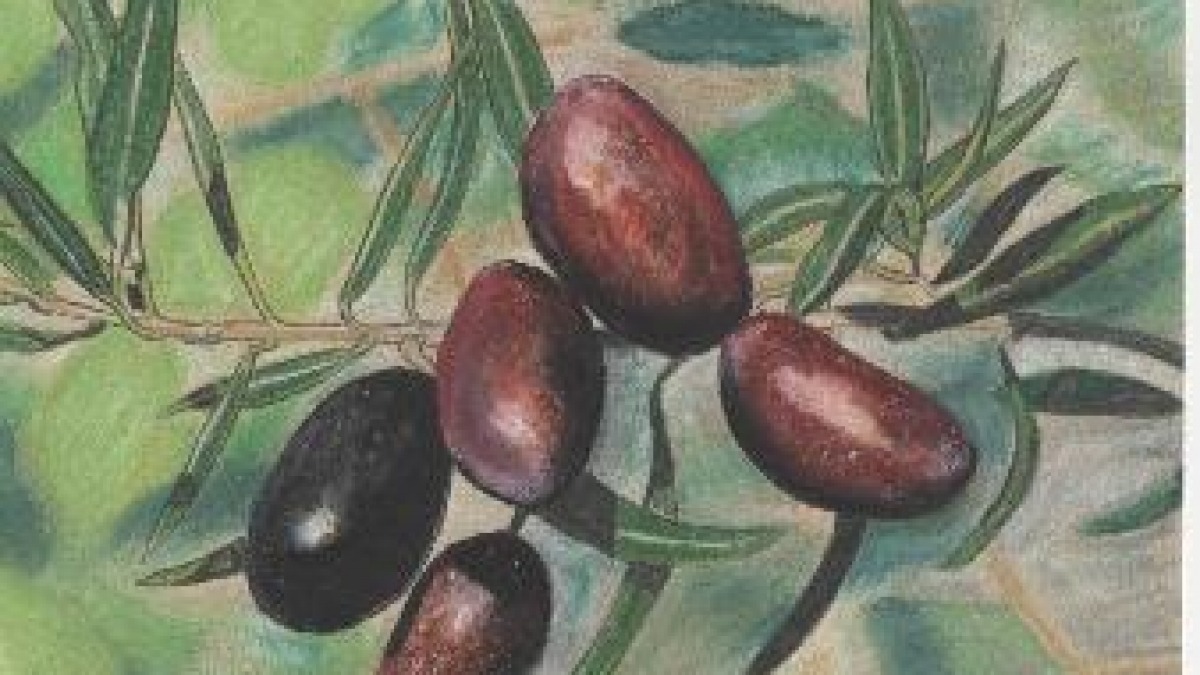Curing olives in California: would Henry consider introducing Sicilian recipes in the future?
I met Henry Robertson about three years ago, when he came to my classes with his lovely wife Carol who organises culinary tours around Italy. They had come to Sicily with a group of about 16 people and during the lesson I immediately understood that Henry's interest for food was actually pure love for nature. I was so surprised when he started talking about the way he makes his own ricotta in San Francisco and later discovered he turned his passion for olives into a business called Henry's olives, curing top quality olives.
Given the importance of olives in Sicilian cuisine, I was obviously charmed and decided to interview him. Here is the interview, followed by one of my Sicilian recipe for olives in extra virgin olive oil. I will find out soon, if he will ever consider using it and let you know.
How did the idea of your business come about? and Did you already had a passion for olives?
My business started from seeing a flat of olives (uncured) at the local CO-OP. They had a curing recipe in the flat. I bought one flat and cured them, then flavored them and we were hooked. We had had home cured olives in the past and usually loved them so our passion just continued to grow from there.
Did you have an idea about specific recipes you wanted to use to cure
your olives?
I did not have any recipes at the time I first cured them except what was in the flat, but for the next 3-4 years I cut out every article I could find on olives and kept a notebook of the information. Over the years I have both copied recipes and created several of my own styles. Traveling to Italy and Greece was an important inspiration.
Which kind of olives do you cure and where do they come from?
I mostly work with Manzanillo and Sevillano olives, though I sometimes get Baronis and Missions to work with. So far all my olives come from a grower who is certified organic near the town of Chico California; not far from here.
What is particular about "Henry's olives"?
It is all about quality. I keep hearing from many of my customers that they never liked olives until they tried mine. Most of these people probably were used to canned black olives or canned Spanish style with a pimento. Henry's Olives are never heated or canned. They are refrigerated as soon as they are cured and kept under refrigeration to keep them fresh. This allows me to use less salt and vinegar to preserve them.
Which are your clients' favourites?
I do a Greek style brine cured olive with oregano, lemon, garlic and bay; typical Greek flavorings. I do a Ligurian style with cinnamon and clove that was inspired by a lunch at a small farm in Liguria. I also do All'Arrabbiata (Angry Style) and an Oil cured black ripe olive with rosemary, orange zest, and red pepper both typical Sicilian styles. These are all very popular, but the best seller in stores is my Lemon-Garlic Manzanillo which people tell me is addicting.
Do you keep experimenting with new recipes and olives? And what about the spices you use?
Every year I try new recipes. I have about 4-5 regular styles in jars(fresh packed not canned) and during the Farmers Market season I have about 7-8 other styles tossed in extra virgin olive oil and other spices, such as the Ligurian and Sicilian styles.
It is a long list of Spices that I use for all of the different styles. Oregano, bay, fennel, rosemary, cayenne(fresh and dried), flaked red pepper, lemon and orange zest, garlic, cinnamon, clove etc.
I use four different curing processes in making my olives. Lye cured, in which the olives are places in a solution of lye and water until it soaks into the olive to the pit and then is rinse out over a period of 7-8 days, then brined and flavored. I also do brine cured where the olives is just soaked in strong brine until the bitterness is removed. This takes the longest of the cures; 6 months to over a year. Then the Spanish style which is a combination of lye and brine cured and last the black ripe oil cured which is cured in rock salt for 5-7 weeks, producing a strong salty black shriveled olive.
What do you think about Sicilian olives? Do you have a favourite kind? When people ask me if I have a favorite, I say "they are like my children; I love them all..."
Where can one find "Henry's olives"?
Locally one can find my olives at most of the local grocery stores/health food stores and at a few stores and restaurants in San Francisco. Also 4-5 local restaurants serve them.
Could you suggest a simple recipe for loveSicily's blog readers?
A recipe I share with everyone is my "Olivada": 2 cups pitted mild green olives, 1/2 cup toasted walnuts, 1/2 teaspoon finely chopped rosemary, 1 medium clove garlic, 1-2 tablespoons extra virgin olive oil. Puree in food processor until smooth. Great served on grilled crostini. Simply delicious!
What do you think about Sicilian olives? What about Sicilian recipes to cure olives?
We loved the olive displays at the markets; especially Ortigia. My favorite was the dark purple brine-cured, big round olive. I don't remember what it was called. I never got to spend any time learning about Sicilian curing recipes, though that would be a highlight if I could. Maybe you could arrange that when we come again.
And I decided I would not wait until we meet again. Here is one of my recipes for Olive alla Siciliana con aceto ed olio extra vergine d'oliva
Ingredients for 4 peoples:
• 500 g of fresh green olives
• vinegar
• extra virgin olive oil
• 1 carrot finely chopped
• 1 heart of celery finely chopped
• 1 or 2 cloves of garlic into slivers
• a tablespoon of capers or a handful of mint leaves
Stone the olives and crush lightly with the back of a fork. Place the olives in cold water and salt. Completely cover all of the olives, make sure none are poking out and change the water on a daily basis. After the first week of the waiting process, taste the olives as the bitterness could already be gone, if not just keep waiting until the olives don't taste bitter any longer.
Blanch carrot and celery in a water and vinegar (50% water 50% vinegar). Blanch olives in the same water and transfer them into a bowl, add all other ingredients.
Mix well, then let stand for several hours in order to absorb the various flavors of the olives.
Finally add a tablespoon of capers or a handful of mint leaves ( I prefer mint in this recipe) and preserve in extra virgin olive oil.



